Rope (film)
| Rope | |
|---|---|
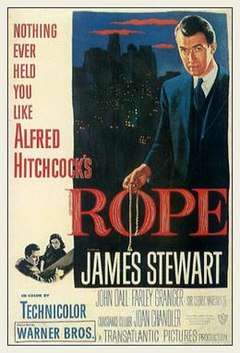 Theatrical release poster | |
| Directed by | Alfred Hitchcock |
| Produced by |
Alfred Hitchcock Uncredited: Sidney Bernstein |
| Screenplay by | Arthur Laurents |
| Story by | Hume Cronyn |
| Based on |
the play Rope by Patrick Hamilton |
| Starring |
James Stewart John Dall Farley Granger Joan Chandler Sir Cedric Hardwicke Constance Collier Douglas Dick Edith Evanson |
| Music by |
|
| Cinematography |
Joseph A. Valentine William V. Skall |
| Edited by | William H. Ziegler |
Production company | |
| Distributed by |
Warner Bros. Pictures (US) Metro-Goldwyn-Mayer (Europe) |
Release date |
|
Running time | 80 minutes |
| Country | United States |
| Language | English |
| Budget |
$1,510,000[1][2] or $2 million[3] |
| Box office | $2.2 million (rentals)[4] or $2,748,000[1] |
Rope is a 1948 American psychological crime thriller film directed by Alfred Hitchcock, based on the 1929 play of the same name by Patrick Hamilton. The film was adapted by Hume Cronyn with a screenplay by Arthur Laurents.[5]
The film was produced by Hitchcock and Sidney Bernstein as the first of their Transatlantic Pictures productions. Starring James Stewart, John Dall and Farley Granger, this is the first of Hitchcock's Technicolor films,[6] and is notable for taking place in real time and being edited so as to appear as a single continuous shot through the use of long takes.[7] It is the second of Hitchcock's "limited setting" films, the first being Lifeboat.[8] The original play was said to be inspired by the real-life murder of 14-year-old Bobby Franks in 1924 by University of Chicago students Nathan Leopold and Richard Loeb.
Plot
Two brilliant young aesthetes, Brandon Shaw (Dall) and Phillip Morgan (Granger), strangle to death their former classmate from Harvard University, David Kentley (Dick Hogan), in their Manhattan penthouse apartment. They commit the crime as an intellectual exercise; they want to prove their superiority by committing the "perfect murder".
After hiding the body in a large antique wooden chest, Brandon and Phillip host a dinner party at the apartment, which has a panoramic view of Manhattan's skyline. The guests, who are unaware of what has happened, include the victim's father, Mr. Kentley (Cedric Hardwicke), and aunt, Mrs. Atwater (Constance Collier); his mother is not able to attend, because of a cold. Also there are his fiancée, Janet Walker (Joan Chandler), and her former lover, Kenneth Lawrence (Douglas Dick), who was once David's close friend.
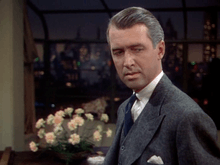
Brandon uses the chest containing the body as a buffet table for the food, just before their housekeeper, Mrs. Wilson (Edith Evanson), arrives to help with the party. "Now the fun begins", Brandon says when the first guests arrive.
Brandon and Phillip's idea for the murder was inspired years earlier by conversations with their prep-school housemaster, publisher Rupert Cadell (Stewart). While they were at school, Rupert had discussed with them, in an apparently approving way, the intellectual concepts of Nietzsche's Übermensch, and De Quincey's art of murder, as a means of showing one's superiority over others. He too is among the guests at the party, since Brandon in particular thinks that he would approve of their "work of art".
Brandon's subtle hints about David's absence indirectly lead to a discussion on the "art of murder". Brandon appears calm and in control, although when he first speaks to Rupert he is nervously excited and stammering. Phillip, on the other hand, is visibly upset and morose. He does not conceal it well and starts to drink too much. When David's aunt, Mrs. Atwater, who fancies herself a fortune-teller, tells him that his hands will bring him great fame, she is referring to his skill at the piano, but he appears to think this refers to the notoriety of being a strangler.
Much of the conversation, however, focuses on David and his strange absence, which worries the guests. A suspicious Rupert quizzes a fidgety Phillip about this and about some of the inconsistencies that have been raised in conversation. For example, Phillip vehemently denies ever strangling a chicken at the Shaws' farm, though Rupert has seen Phillip strangle several. Phillip later complains to Brandon about having had a "rotten evening", not because of David's murder, but because of Rupert's questioning.
As the evening goes on, David's father and fiancée begin to worry because he has neither arrived nor phoned. Brandon increases the tension by playing matchmaker between Janet and Kenneth. Mrs. Kentley calls, overwrought because she has not heard from David, and Mr. Kentley decides to leave. He takes with him some books Brandon has given him, tied together with the rope Brandon and Phillip used to strangle his son.
When Rupert goes to leave, Mrs. Wilson accidentally hands him David's monogrammed hat, further arousing his suspicion. Rupert returns to the apartment a short while after everyone else has departed, pretending that he has left his cigarette case behind. He asks for a drink and then stays to theorize about David's disappearance. He is encouraged by Brandon, who hopes Rupert will understand and even applaud them. A drunk Phillip is unable to take it any more; he throws a glass and says, "Cat and mouse, cat and mouse. But which is the cat and which is the mouse?"
Rupert lifts the lid of the chest and finds the body inside. He is horrified but also deeply ashamed, realizing that Brandon and Phillip used his own rhetoric to rationalize murder. Rupert disavows all his previous talk of superiority and inferiority, then seizes Brandon's gun and fires several shots out the window to attract attention. As police sirens approach, Rupert pulls up a chair next to the chest and the film ends.
Cast
 James Stewart as Rupert Cadell
James Stewart as Rupert Cadell John Dall as Brandon Shaw
John Dall as Brandon Shaw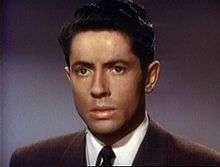 Farley Granger as Phillip Morgan
Farley Granger as Phillip Morgan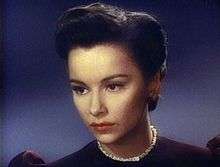 Joan Chandler as Janet Walker
Joan Chandler as Janet Walker Sir Cedric Hardwicke as Mr. Henry Kentley
Sir Cedric Hardwicke as Mr. Henry Kentley
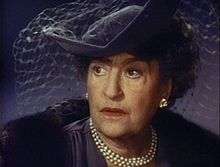 Constance Collier as Mrs. Anita Atwater
Constance Collier as Mrs. Anita Atwater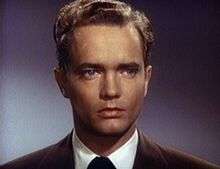 Douglas Dick as Kenneth Lawrence
Douglas Dick as Kenneth Lawrence Edith Evanson as Mrs. Wilson
Edith Evanson as Mrs. Wilson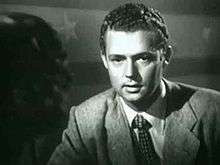 Dick Hogan as David Kentley
Dick Hogan as David Kentley
Production
The film is one of Hitchcock's most experimental and "one of the most interesting experiments ever attempted by a major director working with big box-office names",[9] abandoning many standard film techniques to allow for the long unbroken scenes. Each shot ran continuously for up to ten minutes without interruption. It was shot on a single set, aside from the opening establishing shot street scene under the credits. Camera moves were carefully planned and there was almost no editing.
The walls of the set were on rollers and could silently be moved out of the way to make way for the camera and then replaced when they were to come back into shot. Prop men constantly had to move the furniture and other props out of the way of the large Technicolor camera, and then ensure they were replaced in the correct location. A team of soundmen and camera operators kept the camera and microphones in constant motion, as the actors kept to a carefully choreographed set of cues.[2]
The extraordinary cyclorama in the background was the largest backing ever used on a sound stage.[2] It included models of the Empire State and the Chrysler buildings. Numerous chimneys smoke, lights come on in buildings, neon signs light up, and the sunset slowly unfolds as the movie progresses. Within the course of the film the clouds—made of spun glass—change position and shape eight times.[2]
A camera operator's foot was broken by a heavy dolly during one intensive take, and he was gagged (to stop his vocal noises from being recorded on the film) and hauled out of the studio so that filming could continue without interruption.[10]
Long takes
Hitchcock shot for periods lasting up to 10 minutes (the length of a film camera magazine), continuously panning from actor to actor, though most shots in the film wound up being shorter.[11] Every other segment ends by panning against or tracking into an object—a man's jacket blocking the entire screen, or the back of a piece of furniture, for example. In this way, Hitchcock effectively masked half the cuts in the film.[12]
However, at the end of 20 minutes (two magazines of film make one reel of film on the projector in the movie theater), the projectionist—when the film was shown in theaters—had to change reels. On these changeovers, Hitchcock cuts to a new camera setup, deliberately not disguising the cut. A description of the beginning and end of each segment follows.

| Segment | Length | Time-code | Start | Finish |
|---|---|---|---|---|
| 1 | 09:34 | 00:02:30 | Close-up (CU), strangulation | Blackout on Brandon's back |
| 2 | 07:51 | 00:11:59 | Black, pan off Brandon's back | CU Kenneth: "What do you mean?" |
| 3 | 07:18 | 00:19:45 | Unmasked cut, men crossing to Janet | Blackout on Kenneth's back |
| 4 | 07:08 | 00:27:15 | Black, pan off Kenneth's back | CU Phillip: "That's a lie." |
| 5 | 09:57 | 00:34:34 | Unmasked cut, CU Rupert | Blackout on Brandon's back |
| 6 | 07:33 | 00:44:21 | Black, pan off Brandon's back | Three shot |
| 7 | 07:46 | 00:51:56 | Unmasked cut, Mrs. Wilson: "Excuse me, sir." | Blackout on Brandon |
| 8 | 10:06 | 00:59:44 | Black, pan off Brandon | CU Brandon's hand in gun pocket |
| 9 | 04:37 | 01:09:51 | Unmasked cut, CU Rupert | Blackout on lid of chest |
| 10 | 05:38 | 01:14:35 | Black, pan up from lid of chest | End of film |
Hitchcock told François Truffaut in the book-length Hitchcock/Truffaut (Simon & Schuster, 1967) that he ended up re-shooting the last four or five segments because he was dissatisfied with the color of the sunset.
Hitchcock used this long-take approach again to a lesser extent on his next film, Under Capricorn (1949) and in a very limited way in his film Stage Fright (1950).
Director's cameo

Alfred Hitchcock's cameo is a signature occurrence in most of his films. In this film, Hitchcock is considered to make two appearances,[13] according to Arthur Laurents in the documentary Rope Unleashed, available on the DVD and Blu-ray. Laurents says that Hitchcock is a man walking down a Manhattan street in the opening scene, immediately after the title sequence.
At 55:19 into the film, a red neon sign in the far background showing Hitchcock's profile with "Reduco",[14] the fictitious weight loss product used in his Lifeboat (1944) cameo, starts blinking; as the guests are escorted to the door actors Joan Chandler and Douglas Dick stop to have a few words, the sign appears and disappears in the background several times, right between their visages, right under the eyes of the spectators.
Reception
Box Office
According to Warner Bros records the film earned $2,028,000 domestically and $720,000 overseas.[1]
Critical
Contemporary reviews were mixed. Variety magazine wrote, "Hitchcock could have chosen a more entertaining subject with which to use the arresting camera and staging technique displayed in 'Rope' ... The continuous action and the extremely mobile camera are technical features of which industry craftsmen will make much, but to the layman audience effect is of a distracting interest."[15] Bosley Crowther of The New York Times found that the "novelty of the picture is not in the drama itself, it being a plainly deliberate and rather thin exercise in suspense, but merely in the method which Mr. Hitchcock has used to stretch the intended tension for the length of the little stunt" for a "story of meager range".[16] John McCarten of The New Yorker wrote, "In addition to the fact that it has little or no movement, 'Rope' is handicapped by some of the most relentlessly arch dialogue you ever heard."[17] The Monthly Film Bulletin found that the actors, "for the most part, are excellent," but that "as a film, much of the suspense of the story and the drama of the original written material has been lost because the continual movement within a confined space, although more fluid, is slower and more tiring to watch than a film which has been edited by the conventional method."[18] Harrison's Reports gave the film a very positive review, calling it "An exceptionally fine psychological thriller" with "excellent" acting and "an ingenious technique, and under Hitchock's superb handling it serves to heighten the atmosphere of mounting suspense and suspicion."[19] Edwin Schallert of the Los Angeles Times wrote: "It is unusual enough to shine more as a technical tour de force than as a moving sort of film ... The interesting experimental values in this Hitchcock production could never be denied, yet I would not rate it one of his best."[20]
In Time magazine's 1948 review, the play that the film was based on is called an "intelligent and hideously exciting melodrama" though "in turning it into a movie for mass distribution, much of the edge [is] blunted," explaining:
Much of the play's deadly excitement dwelt in [the] juxtaposition of callow brilliance and lavender dandyism with moral idiocy and brutal horror. Much of its intensity came from the shocking change in the teacher, once he learned what was going on. In the movie, the boys and their teacher are shrewdly plausible but much more conventional types. Even so, the basic idea is so good and, in its diluted way, Rope is so well done that it makes a rattling good melodrama.[21]
On its theatrical release in 1948, Rope performed poorly at the box office. In Rope Unleashed, screenwriter Arthur Laurents attributed this failure to audience uneasiness with the homosexual undertones in the relationship between the two lead characters.[13]
Nearly 36 years later, Vincent Canby, also of The New York Times, called the "seldom seen" and "underrated" film "full of the kind of self-conscious epigrams and breezy ripostes that once defined wit and decadence in the Broadway theater"; it's a film "less concerned with the characters and their moral dilemmas than with how they look, sound and move, and with the overall spectacle of how a perfect crime goes wrong".[22]
Roger Ebert wrote in 1984, "Alfred Hitchcock called Rope an 'experiment that didn't work out', and he was happy to see it kept out of release for most of three decades," but went on to say that "Rope remains one of the most interesting experiments ever attempted by a major director working with big box-office names, and it's worth seeing [...]."[9]
A 2001 BBC review of that year's DVD release called the film "technically and socially bold" and pointed out that given "how primitive the Technicolor process was back then", the DVD's image quality is "by those standards quite astonishing"; the release's "2.0 mono mix" was clear and reasonably strong, though "distortion creeps into the music".[23]
In his article "Remembering When", Antonio Damasio argues that the time frame covered by the movie, which lasts 80 minutes and is supposed to be in "real time", is actually longer—a little more than 100 minutes.[24] This, he states, is accomplished by speeding up the action: the formal dinner lasts only 20 minutes, the sun sets too quickly and so on.
Rope presently holds a score of 97% on the review aggregator website Rotten Tomatoes, with 34 out of 35 surveyed critics giving the film a positive review.[25]
See also
- Compulsion, a 1959 film based on the Leopold and Loeb events.
- Psychoville, a 2009 BBC2 comedy series. Episode four of the series is a deliberate two-take pastiche of Rope.
- R.S.V.P., a 2002 film that borrowed several key elements from Rope, and in which the film is discussed.
- Swoon, an independent 1992 film by Tom Kalin depicting the actual Leopold and Loeb events.
- In Rake Season 2, episode 3, 'Woolridge and Anor' the film is seen as an influence for a murder by two school girls.
- Birdman, a 2014 film that uses a similar long take technique.
Notes
- 1 2 3 Warner Bros financial information in The William Shaefer Ledger. See Appendix 1, Historical Journal of Film, Radio and Television, (1995) 15:sup1, 1-31 p 29 DOI: 10.1080/01439689508604551
- 1 2 3 4 Truffaut, François (1967). Hitchcock/Truffaut. New York: Simon & Schuster.
- ↑ Variety, February 18, 1948, pg 14.
- ↑ "Top Grossers of 1948". Variety, January 5, 1949, pg 46.
- ↑ Rope Unleashed – Making Of (2000) – documentary on the Universal Studios DVD of the film.
- ↑ "Before Birdman There Was Alfred Hitchcock's Rope".
- ↑ The AFI Catalog of Feature Films:Rope
- ↑ "Lifeboat". Retrieved June 8, 2017.
- 1 2 Ebert, Roger. "Rope". Chicago Sun-Times. Retrieved November 8, 2008.
- ↑ IMDb: Rope
- ↑ Jacobs, Steven (2007). The Wrong House: The Architecture of Alfred Hitchcock. p. 272.
- ↑ "Variety (March 1948)". archive.org. Retrieved June 8, 2017.
- 1 2 Interview with Arthur Laurents in the making-of documentary, Rope Unleashed.
- ↑ Gottlieb, Sidney: Hitchcock on Hitchcock. Faber and Faber, 1995. p282.
- ↑ "Rope". Variety: 14. September 1, 1948.
- ↑ Crowther, Bosley (August 17, 1948). "'Rope': An Exercise in Suspense Directed by Alfred Hitchcock". The New York Times. Retrieved May 14, 2009.
- ↑ McCarten, John (September 4, 1948). "The New Yorker": 61.
- ↑ "Rope (1948)". The Monthly Film Bulletin. 15 (180): 176. December 1948.
- ↑ "'Rope' with James Stewart, John Dall and Farley Granger". Harrison's Reports: 138. August 28, 1948.
- ↑ Schallert, Edwin (September 25, 1948). "'Rope' Attains Ultimate Grimness in Murder Vein". Los Angeles Times: 11.
- ↑ "The New Pictures". Time. September 13, 1948. Retrieved May 14, 2009.
- ↑ Canby, Vincent (June 3, 1984). "Hitchcock's 'Rope:' A Stunt to Behold". The New York Times. Retrieved May 14, 2009.
- ↑ Haflidason, Almar (June 18, 2001). "Rope DVD (1948)". BBC. Retrieved May 14, 2009.
- ↑ Damasio, Antonio. "Remembering When" in Scientific American, 2002.
- ↑ "Rope". Rotten Tomatoes. Retrieved May 17, 2017.
References
- Neimi, Robert (2006). History in the Media: Film and Television. ABC-CLIO. ISBN 1-57607-952-X.
Further reading
- Wollen, Peter. Rope: Three Hypotheses. Alfred Hitchcock Centenary Essays.
- Miller, D. A. 'Anal Rope.' Representations 32 (Aut. 1990): 114-133.
External links
| Wikimedia Commons has media related to: |
| Wikiquote has quotations related to: Rope (film) |
- Rope on IMDb
- Rope at the TCM Movie Database
- Rope at AllMovie
- Rope at the American Film Institute Catalog
- Rope at Rotten Tomatoes
- Trailer for Rope